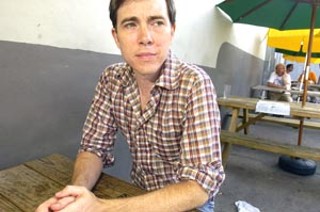I'm New Here
Bill Callahan ain't too much to love
By Audra Schroeder, Fri., July 1, 2005

"I was a stranger when I came into this town yesterday. ... They don't come much stranger." – From Smog's 1997 album Red Apple Falls.
Because of the brutally honest nature of his songs, Bill Callahan has been called a jerk. But as we sit under a threatening gray sky at the Spider House in Central Austin, Callahan is relaxed. He brushes back his salt-and-pepper-colored hair, bluish gray eyes canvassing the scene. His face is friendly, intermittently cracking into a quick smile before he puts his poker face back on. He pauses long and often when speaking, as if channeling his inner narrator for the most potent words. Sipping a Sierra Nevada and staring into the distance, above the frat boys and artists and musicians, Callahan smiles knowingly, like a man who's cracked the code.
Bill Callahan is also known as Smog, and, briefly in the late Nineties, (Smog). He's never had a Top 40 hit or a flashy, masturbatory spread in Rolling Stone. Instead, he's the autobiographer in a world of his own creation, and the truth is seldom pretty. Jealousy, greed, sexual drama, violence, and death all make their rounds in his prolific output – 12 albums in 15 years. After that, most people don't know anything more about Callahan.
Where contemporaries like Beck perfect the über-bored Cali swing and Will Oldham is the quiet Appalachian stoic, Callahan is a real nowhere man, having lived in Maryland, Georgia, South Carolina, Chicago, Sacramento, San Francisco, and now Austin. As his inner chronicler dictates, he has no roots, no history outside the stories he spins. In fact, he's telling human stories in a time when we are happily being spoon-fed shallow, vanilla-flavored characters. He's cursed with pure honesty and a sense of humor as dry as tumbleweeds. What a jerk.
In 2003, after passing through Austin during a stint at South by Southwest, Callahan felt a distinct affinity for River City and the people he met here. So he pulled up stakes in Chicago and moved here in early 2004, sleeping in a car in the parking lot of a La Quinta before moving on to his current South Austin home. "It's right on the edge of the city, where they just stopped building," he says. "I'm literally surrounded by dead ends. There's only one way out."
On his 12th and latest album, A River Ain't Too Much to Love, once again on Smog franchise label Drag City, Callahan's molasses drawl runs down 10 songs of isolated self-reflection and identity, never jumping above a quiet "Fuck all y'all." He doesn't so much sing as deliver a deadened blues sermon that's both contemplative and boiling within. On the surface, the river never ripples. From the hopefulness of "The Well" ("Well they say black is all colors at once, so I gave it my red rage, my yellow streak, the greenest parts of me, and my blues") to the pastoral hues of "Let Me See the Colts" ("Is there anything as still as sleeping horses?"), Callahan's previous unease has been channeled into corn-fed nature brother blues – a man at peace with the world. Well, sort of: Callahan admits the rambling "I Feel Like the Mother of the World" is about "War. Or peace. Or Palestine, Israel, USA, Iraq."
On opener, "Palimpsest," Callahan faces his conflicted wanderlust: "Why's everybody looking at me like there's something fundamentally wrong? Like I'm a southern bird who stayed north too long."
"That line has more to do with migration," Callahan explains with a smile. "It's about that natural migratory urge – it could be south to north, too. Which some animals do."

The song concedes that urge: "Winter exposes the nest and I'm gone."
"I'm not easily fooled by pseudo-home atmospheres," he says. "But Austin isn't trying to be. ... A place like this is just a place like this."
Callahan hasn't always been so content. He was born in Silver Spring, Md., and describes his childhood in cyclical (and appropriately obtuse) terms: "I liked to go fishing but never caught anything. Except once I caught a holy trinity of fish, the little one getting eaten by the bigger one again and again." He picked up the guitar at age 14 and began writing songs he describes as "nonsense." Influenced by the SST acts of the era, the Minutemen and Meat Puppets especially, he began recording the songs, eventually taking to the stage.
"It was Coney Island, at a venue where they used to have sideshows," he says of his first gig. "It was me and a friend who was this total metalhead guitar player, and I'm sure it was really weird. We played a lot of the songs that were on my first album, but with Eddie Van Halen guitars."
Callahan went on to produce a handful of 4-track recordings in the late Eighties, which he released on his own Disaster label. One of the earliest, a cassette titled Macramé Gunplay, foreshadowed what would become his signature tattered sound. His first proper LP, 1990's Sewn to the Sky, cultivated his spare style and dark humor while experimenting with more lo-fi bedroom noise. 1993's Julius Caesar found Callahan sharpening his tongue on songs like the menacing "Your Wedding" ("I'm gonna be drunk, so drunk, at your wedding") and "Stick in the Mud" ("There's nothing I'd rather see than for you to fail"), getting morbid on 1997's The Doctor Came At Dawn ("I hope you don't mind if I grab your private life, slap it on the table, and split it with a knife"), and opening up on 1999's Knock Knock: "For the first time in my life, I let myself be held like a big old baby." Songs range from bleak acoustic laments to celebratory numbers about Star Wars and sexified tributes to Prince.
Callahan's good at extremes. The majority of his Nineties output hung precariously between humorous and downright feral. 2000's Dongs of Sevotion captured this. Take his deadpan lyrics from "Dress Sexy at My Funeral" ("Dress sexy at my funeral my good wife. For the first time in your life wear your blouse undone to here, and your skirt split up to here") and "Cold Discovery" ("Well I can hold a woman down on a hardwood floor. This was my, my cold discovery"). This misanthropic milieu has surrounded Callahan through the years. Do any research on Smog and you'll find he has quite a cult following and that there are plenty of folks who want to peg him as a misogynist or a tortured soul for their own piece of mind. While his lyrics have always been straightforward, he shrugs off any labels. He's not here to be a role model.
His latest album offers some closure, a scene of resolution for the author after years of tension and climax. River is quite a departure from his earlier works, in that it soothes rather than seethes. It smells less of stale beer and failure and more of, say, maturity. As he remarks on the charming "Running the Loping," he's "getting off on the pornography" of his past.
"I forced myself to finish it quickly," Callahan says of River. "I wrote 'em all at home, and I just come with a title I think tells a story, or a phrase, and sort of build around it."
River came together in about six months, recorded at Pedernales in Spicewood, Texas, a former country club Willie Nelson turned into a studio. Callahan writes mostly at home, where he lives alone, handling the day-to-day business of being Smog. He is his own manager. Callahan tours the same way he lives, sometimes cobbling together a band days before heading out, often having only a few practices to go on. In addition to touring and writing, he recently put out a trio of sketchbooks (appropriately titled Women, The Death's Head Drawings, and Ballerina Scratchpad) and is currently compiling an "epistolary novelette," which will contain a series of his letters over the years.
Callahan doesn't know how long he'll stay in Austin. If River's redemptive tales are any indication, only he knows whether he wants to be the stranger here or elsewhere. He's optimistic this is the best album he's made so far, the most revealing and the most honest. Where his earlier albums offered a look through a fractured lens, this latest vision is clarity.
"I guess it's just supposed to be something to savor in your mind," Callahan ventures when asked what the title means. "It doesn't have a distinct meaning. I think it will mean different things to different people, different things over time, but I think that's just part of human nature." ![]()









